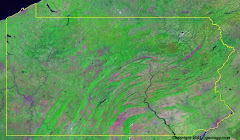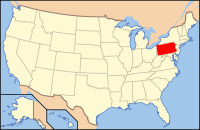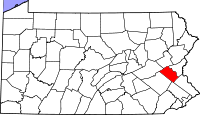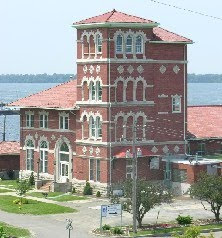I finally made it to the Kutztown Folk Festival! I've wanted to go for so many years and never was able to go. I wasn't there for too long, but it was very enjoyable. Kutztown is a small town in Berks County, which lies directly west of Lehigh County. Many of its original settlers were Pennsylvania German farmers.
One speaker, I think it was Dr. Donner from Kutztown University, said that the festival is in its 60th year. It is called a "folklife" festival rather than "folklore" festival, because it highlights the culture by showing the way people live, such as crafts and farming. The word "folklore" seems more limited to just words and stories.
From what I understand, the Pennsylvania Germans arrived in Pennsylvania in the 1600s and 1700s. Most of them came from areas of what is today southwest Germany, and part of Switzerland. I think that Germany did not actually become a country until much later, around 1870. The people spoke several local dialects, and after they arrived here those dialects blended, and also evolved over time. (The language and people are sometimes called "Pennsylvania Dutch" because the dialect word for "German" is Deitsch, which sounded to English ears like "Dutch".)
At the festival, I ran into Frank Shuler and his wife Janice from my Pennsilfaanisch Deitsch Freind (Pennsylavania German Friends organization). They told me that Paul Kunkel was going to be speaking in the Seminar tent, and I was very happy to hear that. Paul has been a leader in Pennsylvania German cultural education for many years. He was my teacher in a Pennsylvania German class, in a Groundhog Lodge course, almost twenty years ago!
I really enjoyed his talk today - about Pennsylvania Dutch superstitions. What made it interesting is how he related it to what family members told him as he was growing up. So much more real than reading about these things in books! Then he told a story in the dialect, as a friend of his translated. That was delightful - I could compare the sounds of each sentence in German and English. That helped me learn more of the dialect - somehow it seemed easier to understand this way. Perhaps because the sentences were broken down one-by-one, I didn't lose the gist of the story as easily.
The other speakers were interesting also - topics were: One-room schoolhouses, quilts, jokes, and Pennsylvania Germans in the Civil War. The Pennsylvania German Society sponsored the venue, and it was evident how much work went into the preparation by all involved.
I got to experience a little of the rest of the festival - crafts, food and music. I hope to go again next year to see more.
Subscribe to:
Post Comments (Atom)




No comments:
Post a Comment